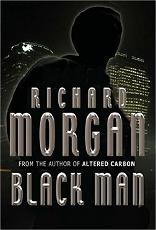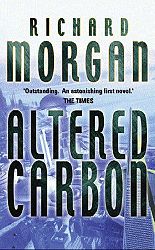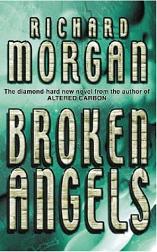
Black Man
Richard Morgan
630 pages
published in 2007
This was too much of a rerun for me. Black Man (published in the US as Thirteen for obvious reasons) has much the same plot as Morgan’s first novel Altered Carbon. A worldweary, cynical but ubercompetent mercenary is blackmailed into going after a murderer and in the process uncovers a far greater and more horrible truth than he suspected existed or his employers necessarily wanted him to find out. As with every Morgan novel I’ve read so far it’s an edge of your seat thriller, keeps you engaged to the bitter end, but five minutes later you’re thinking “that’s all“? I got the feeling Morgan was going through the motions, his heart not in it and it just seemed too slight to be worth a Clarke Award.
One big reason for the discomfort I felt was the silly worldbuilding. Morgan is excellent at creating a “realistic” sounding world, using infodumps, incluing and jargon to create an image in his readers’ heads, but it doesn’t work when he bases his future on the infamous Jesusland map. Remember 2006, after Bush had started his second (stolen) term and before the Congressional midterm elections, and how many of the liberal leaning blogs were despairing of their country? How it really seemed for a moment the US was split in two, with progressive coasts and an ignorant flyover country? Yeah? Remember also how fast that changed once the Democrats actually won an election? Well, it’s this that Morgan bases his future on: the Jesusland maps and books like Thomas Frank’s What’s the Matter with Kansas. It was already dated when he was writing it, now just feels hopelessly silly. It makes it hard to take the world Morgan created seriously.

